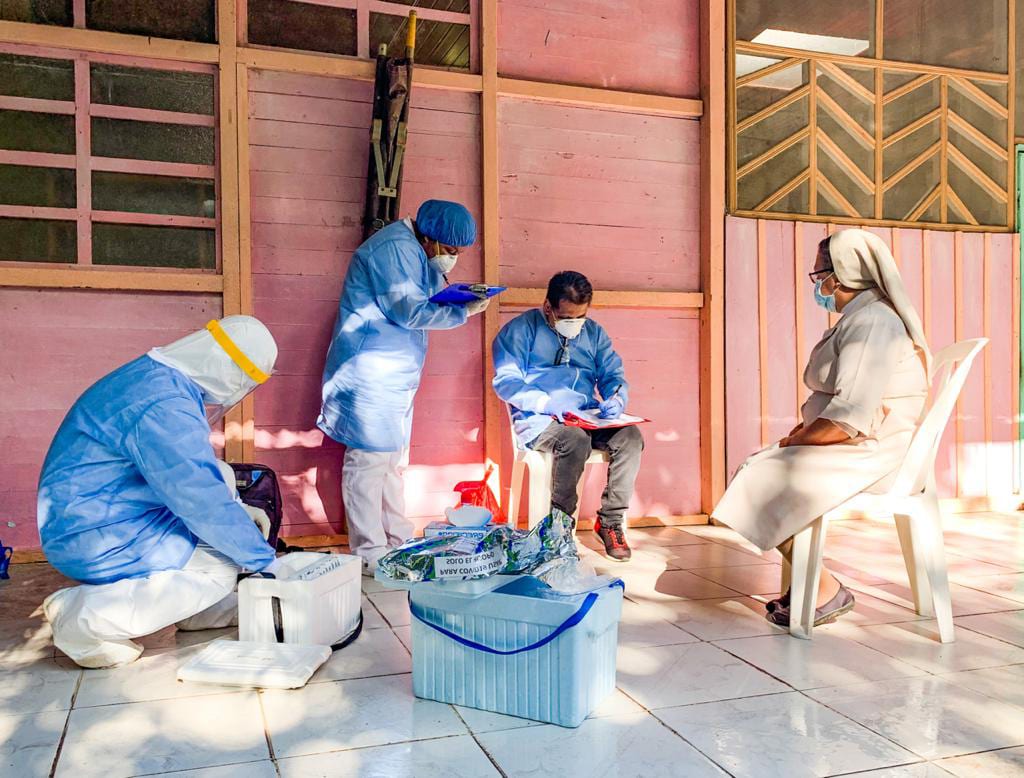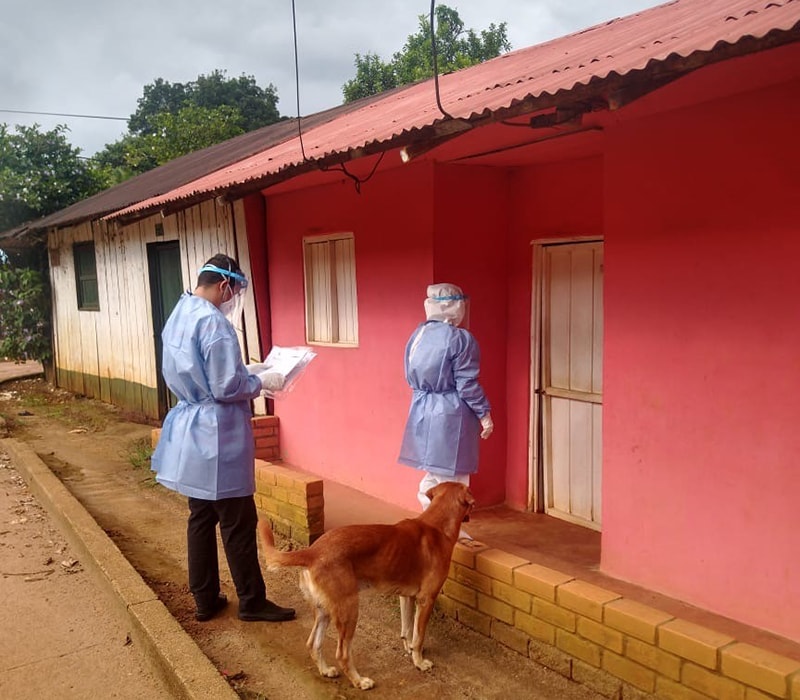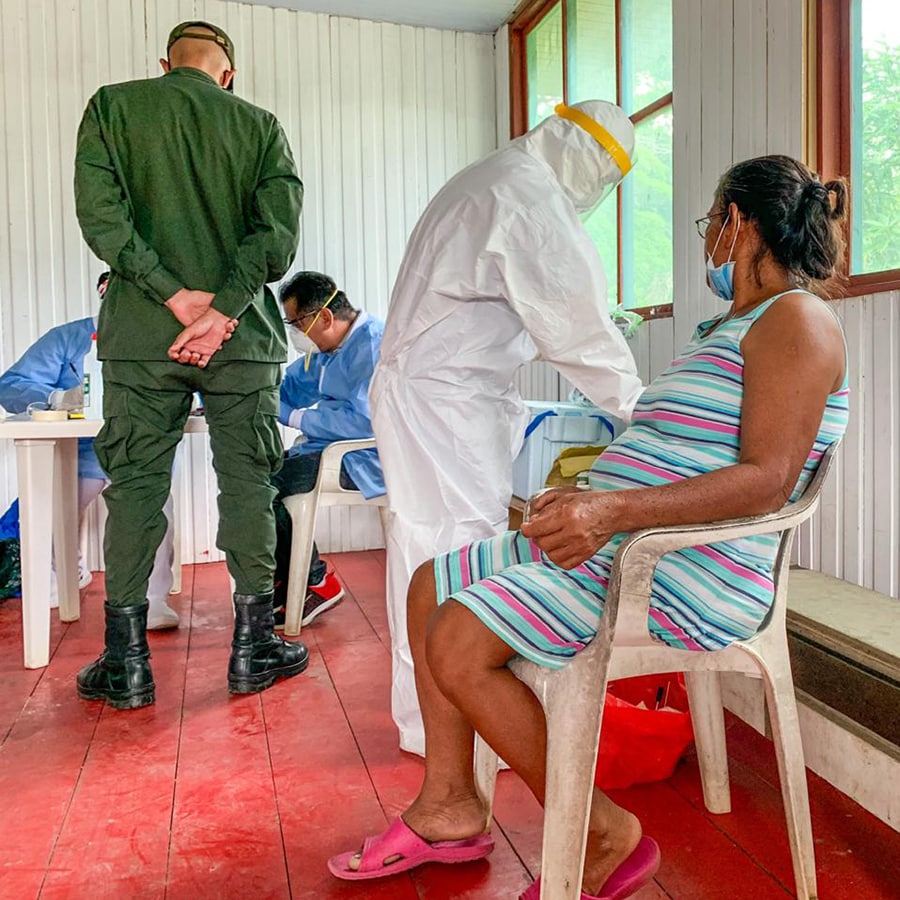CoronApp Strengthens FETP Efforts in Colombia

FETP field investigation with the Amazonas State Department of Health in San Juan de Atacuari, on the border with Brazil, May 2020.
A lot has happened since CDC and the National Health Institute (INS) in Colombia established a group of disease detectives through Colombia’s Field Epidemiology Training Program (FETP) in 1992. Since then, INS has strengthened its reputation as the go-to public health institution in Colombia, and FETP has taken leading roles in disease detection response. Their strengths have been particularly evident during the current COVID-19 response. Both have been using a new application to prevent and contain the spread of COVID-19 in Colombia.
The INS began using CoronApp in March after Iván Duque Márquez, the president of Colombia, supported app improvement efforts to include COVID-19 prevention, containment, and mitigation measures. CoronApp shares the latest government messaging and information about COVID-19 with users. The app also captures user locations, which allows mapping of all suspected cases. Additionally, it confirms whether users have provided information to the national surveillance system for future follow-up.

Two FETP residents conducting contact tracing in Mitu village, Vaupes, Colombia (border with Brazil) the first eleven COVID-19 cases were detected.
As of the end of June, the app had been downloaded nearly 11 million times, and more than 5.5 million active users had entered their health status and symptoms. The health status information identifies people at risk for severe COVID-19 infection, and the symptom data alerts officials about possible COVID-19 cases.
FETP residents and graduates use the CoronApp to monitor data collected from users in real time and apply the data to coordinate Colombia’s COVID-19 response with local, departmental, and national authorities. Some residents and graduates based in Bogota help lead the federal response to the COVID-19 pandemic. Others have been deployed to help local and departmental authorities with disease response efforts.
At the national level, FETP residents and graduates play essential roles within the INS Public Health Emergency Operations Center, helping the EOC build their workforce capacity to handle all facets of the COVID-19 pandemic. For example, residents and graduates use the skills they learned from FETP to lead and manage risk analysis rooms. They also use their technical skills to capture vital information on probable cases from sources such as notification forms, clinical histories, and laboratory results.

FETP residents with the Amazonas State Department of Health conducting a field investigation for COVID-19 in San Juan de Atacuari on the Brazilian border.
One example of the value of FETP’s contribution at the local level was recently seen in the city of Leticia, which lies on Colombia’s border with Brazil. A cluster of 20 cases of COVID-19 was detected with the CoronApp alert notification system. Understanding the location of the cluster led seven FETP residents and graduates to activate a rapid response team, deploy to the field, collect samples, confirm cases, trace contacts, and isolate people to prevent further spread of the disease.
In the department of North Santander, the CoronApp helped discover 40 cases of COVID-19 in a community where many were at high risk for severe infections. This led FETP residents and graduates to quickly deploy to North Santander to coordinate with local health services to investigate cases, identify contacts, and isolate ill people to prevent the spread of COVID-19. In addition, FETP residents and graduates developed risk-specific messages for the community and prepared health facilities to meet the healthcare needs of COVID-19 patients.
This isn’t the first time FETP residents and graduates have used an app to monitor infectious diseases in Colombia. During Pope Francis’s 2017 visit to Colombia, they used a mobile surveillance system app called Guardianes de La Salud (Guardians of Health) to identify potential disease outbreaks.
The work of FETP residents and graduates in Colombia is a classic example of FETP trainees mobilizing to support disease control efforts at all levels of the country. With their disease detective training and an innovative app, FETP residents and graduates are playing a vital role in Colombia’s response to the COVID-19 pandemic.
